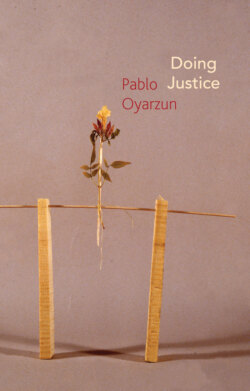Doing Justice

Реклама. ООО «ЛитРес», ИНН: 7719571260.
Оглавление
Pablo Oyarzun. Doing Justice
Contents
Guide
Pages
Series title. Critical South
Doing Justice. Three Essays on Walter Benjamin
Copyright page
Note on the Texts
Introduction “…beneath these clouds” Jacques Lezra
Notes
Prologue Doing Justice?
Notes
1 On Benjamin’s Concept of Translation. Preamble
I
II
Conclusion
Notes
2 Four Suggestions about Experience, History, and Facticity in the Thought of Walter Benjamin* The First Suggestion
Experience
History
Facticity
Note
Notes
3 Narration and Justice. Preamble
The Catastrophe of Experience
The Melancholic Difference between Technology and Artisanship
Death as Sanction
Memory and Temporality
Natural History, Myth and Something Else about Memory and Narration
Repetition
Storytelling and Justice
Envoi
Notes
Bibliography
Index
POLITY END USER LICENSE AGREEMENT
Отрывок из книги
The publication of this series is supported by the International Consortium of Critical Theory Programs funded by the Andrew W. Mellon Foundation.
Series editors: Natalia Brizuela and Leticia Sabsay
.....
As do so many other texts by Benjamin—so that we might even say that this is an indelible trait of his writing—[“The Storyteller”] gives the impression of guarding a secret whose revelation would completely destroy the force of its truth. It is a weak power, then, like the one “The Concept of History” speaks about. This weak power—which is the one and only one required for justice—might well be the power that weaves together both the story of the storyteller and Benjamin’s text. It is as if what the essay itself—in its general fabric, in its argumentative vectors and its repertoire of images and its examples, its twists and turns, in short, in its style—says about storytelling gave an account of itself. (Chapter 3, p. 107)
Here again the translation is tricky, and I’ll return to it—in this case, to the expression Es como si … en su estilo, se estuviese dando cuenta, which is not exactly, and not only, “It is as if… in its style, what the essay itself says about storytelling gave an account of itself.” The verbal form dar cuenta crops up in both cases, in the first sentence I quoted and in this last one: it can be translated “to give account” or “to render an account.” It is as if the philosopher gives an account, dar cuenta, or a reckoning of what the storyteller recounts: the Spanish verb is contar cuenta. And it is as though, at the close of Oyarzun’s Doing Justice, this account of a telling, this reckoning of telling, has a twist: Es como si… en su estilo, se estuviese dando cuenta. It is as though, in its style, it—but what? Or who?—were realizing, becoming aware, of what the essay itself attributes to the story. The work became its daemon. Darse cuenta: to realize, to come into reckoning with, though reflexively: dar-se, to give oneself the reckoning.
.....